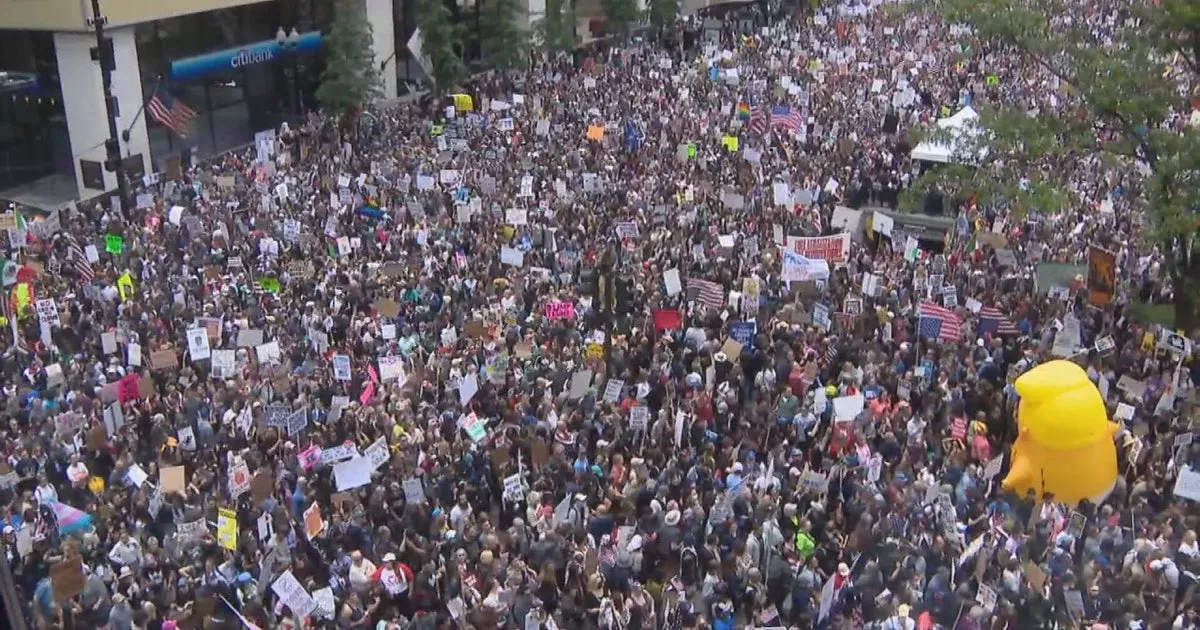
On Saturday afternoon, thousands of people are anticipated to gather for a significant No Kings protest at Chicago's Grant Park. This demonstration, organized by the Hands Off Chicago Coalition, consists of various local campaign and advocacy groups united in their mission. This event marks the second protest under the No Kings movement in the Chicago area, and it is also the third major demonstration in downtown Chicago since President Trump's second term commenced in January.
The inaugural No Kings Chicago protest took place in June at Daley Plaza, attracting tens of thousands of demonstrators. To accommodate the expected larger crowd, Saturday’s protest has been relocated to Grant Park, which offers more space. Attendees should prepare for potential disruptions, as streets surrounding Grant Park will likely experience rolling closures, particularly when the march commences.
Despite a forecast predicting rainy and gloomy weather with the possibility of thunderstorms, organizers have assured the public that the rally and march will proceed as planned, regardless of the conditions. Additionally, there are more No Kings protests scheduled in various Chicago suburbs, expanding the movement's reach across the region.
The June No Kings protest, along with the 50501 protest held in April, was primarily organized in opposition to several Trump administration policies, including cuts to social security, Medicaid, immigration reform, and tax regulations. Since then, Chicago has emerged as a focal point for the administration, particularly concerning immigration enforcement. The launch of Operation Midway Blitz in early September saw hundreds of U.S. Immigration and Customs Enforcement (ICE), Customs and Border Protection (CBP), and other federal agents deployed in the Chicago area to apprehend undocumented immigrants.
The Department of Homeland Security has reported approximately 1,500 arrests under Operation Midway Blitz, although not all arrests were made in Illinois. It remains unclear how many individuals are still in detention or facing deportation. This operation has triggered protests, notably outside the Broadview ICE processing facility located in the suburbs west of Chicago. Tensions have escalated between federal agents and local residents, highlighted by a tragic shooting incident involving an undocumented immigrant in Franklin Park and another shooting in Brighton Park.
Recent confrontations have seen federal agents using tear gas in residential areas, creating a volatile atmosphere. Chicago Police Superintendent Larry Snelling has expressed concerns regarding the impact of these tactics on his officers, who are ill-equipped to manage such situations. In response to escalating tensions, a federal judge mandated that all immigration agents must wear body cameras while on duty to monitor their actions closely.
In a controversial move, President Trump sought to deploy the National Guard in Illinois, claiming that federal immigration agents and facilities were under attack from protesters and required protection. However, a federal judge issued a temporary restraining order blocking this deployment, a decision that was upheld by a federal appeals court. This restraining order is currently effective for two weeks, with further court proceedings scheduled to determine its potential extension.
As the No Kings protest unfolds this Saturday, it is clear that the movement has gained significant traction, addressing critical issues that resonate with many Chicago residents. The outcome of this demonstration may have lasting implications for the political landscape in the city and beyond.